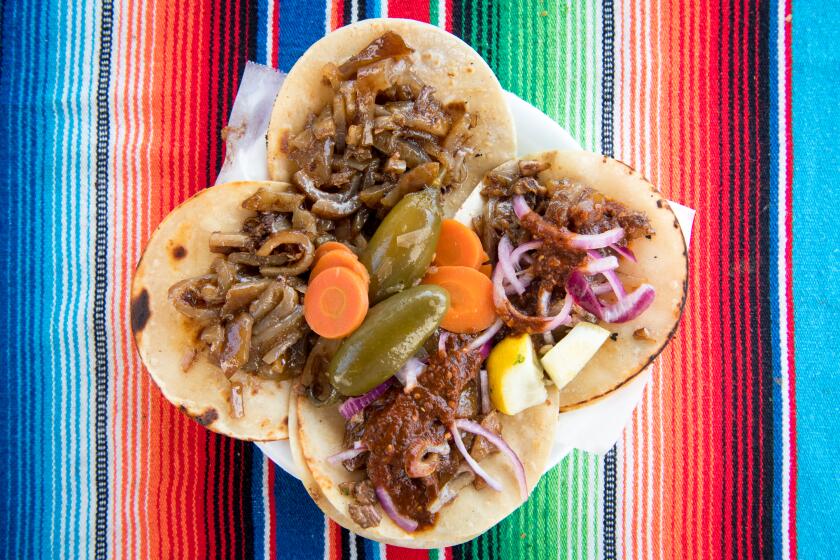Review: Silver Lake’s Ceviche Project is a restaurant made for summertime
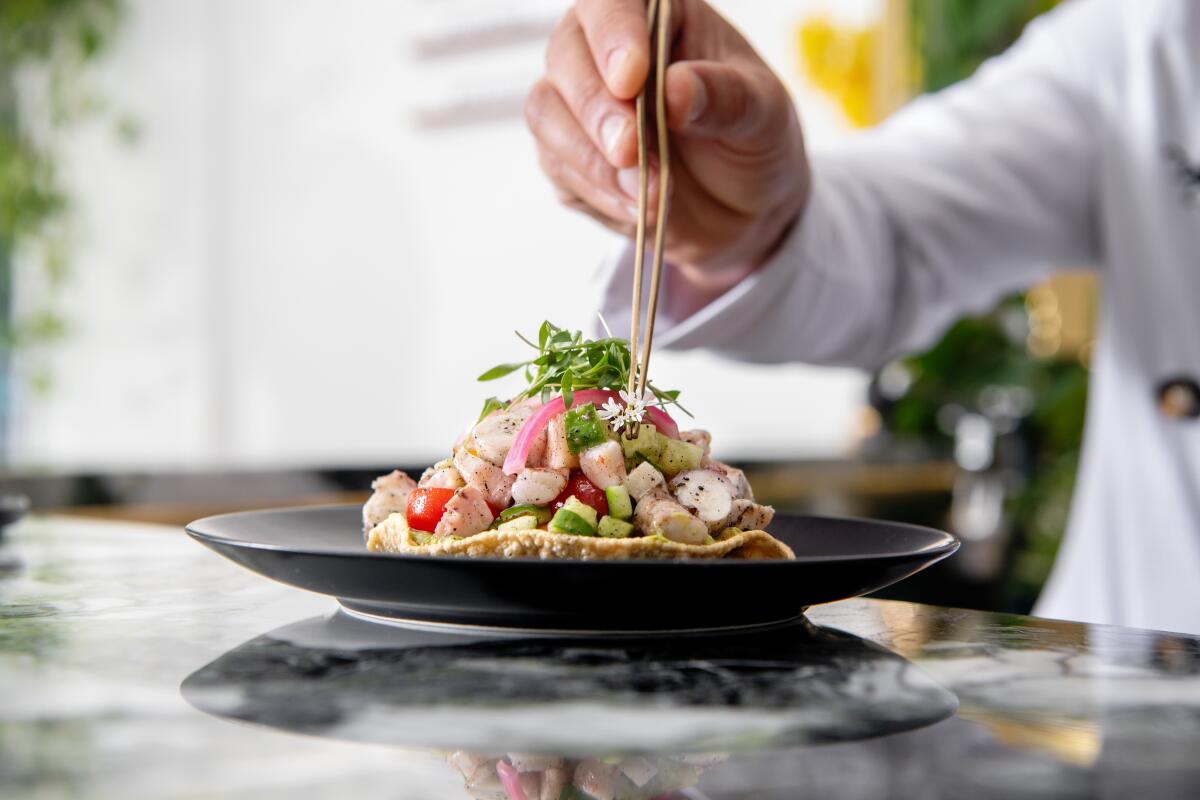
- Share via
Beachside page-turners and boppy pop tunes that stick like molten asphalt can forever stamp the way we remember a particular summer. So can the right new restaurant. Some favorite touchstones of summer 2019: Ocean Vuong’s debut novel, “On Earth We’re Briefly Gorgeous,” Kygo’s reverent remix of Whitney Houston’s rarely heard 1990 cover of “Higher Love” — and Ceviche Project, a 28-seat seafood bar in Silver Lake that’s ideal for hiding from the heat and the world.
This isn’t a summer blockbuster of a restaurant. It’s an indie charmer, urbane and light enough for an hour or two of sparkling diversion.
Restaurant critic Bill Addison pinpoints seven recent reviews, from a carnitas food truck to a tiny Japanese wonder, that illustrate the city’s amazing dining culture.
Ceviche Project resides without much street presence in a strip mall painted a distracting shade of eggplant. Inside, the space has a self-contained charisma: white walls that are calmingly stark, orchids in bloom on brass-framed shelves, a marble bar whose churning shades of green suggest seaweed swirling in tidal pools, gentle rhythms of calypso and jazz whirling from a record player.
The room’s center of gravity is Mexico City native Octavio Olivas, a one-man cevicheria preparing seafood behind his restaurant’s snug counter. Wearing his hair slicked and rocking a crisp, buttoned naval captain’s jacket emblazoned with an octopus insignia, he manages to look dashing while staying in near-constant motion.
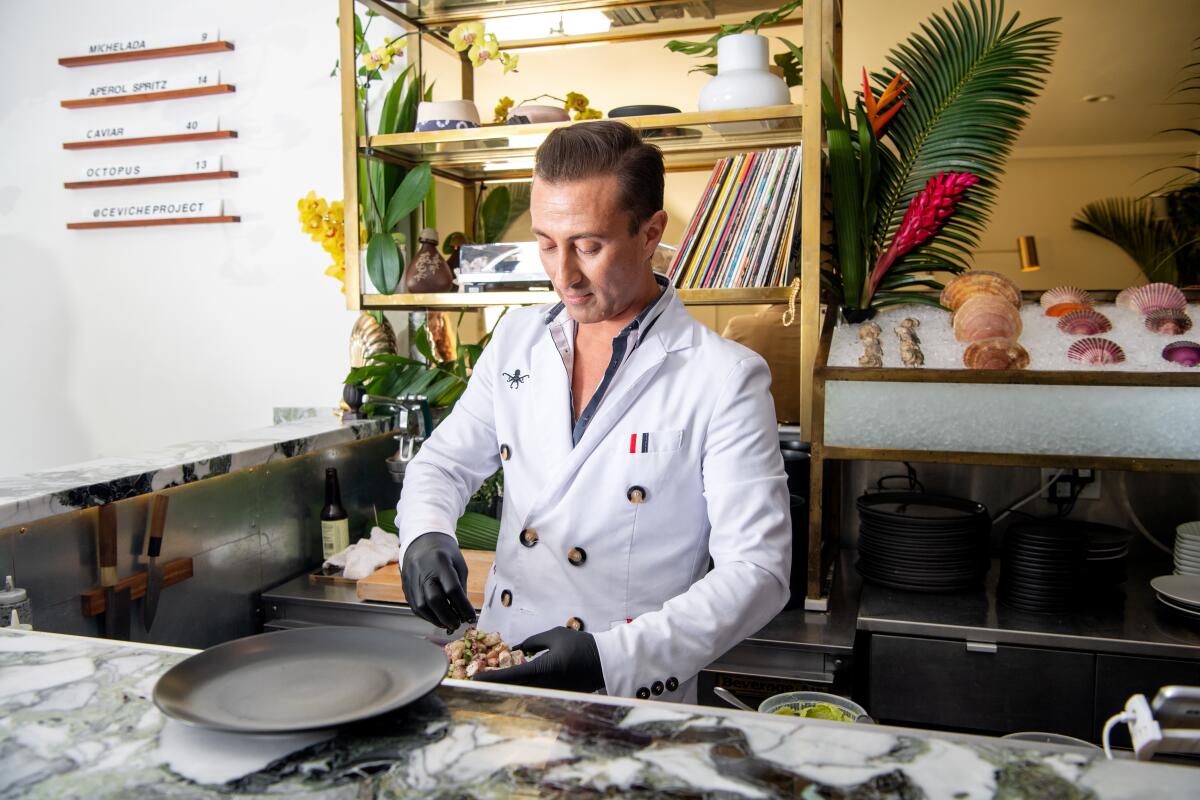
Everything he needs is close at hand: He reaches behind him to the display of shellfish on ice and plucks a scallop shell; he pries it open, slices through the muscle and decorates the bivalve with tangerine segments, pomegranate seeds, serrano peppers and, for a $3 upcharge (worth it), uni. He merges pineapple, jicama, corn nuts, wisps of red-orange carrot and plantain chips in a bath of citrus he draws for tai snapper ceviche. Then he’s on to cracking snow crab claws, or breaking down a hunk of yellowfin tuna during infrequent quiet moments.
Olivas ditched his career as a lawyer in 2012, transitioning into the culinary world via pop-ups and food festivals, honing his ideas until he finally opened his own place four months ago. His menu runs brief: a few straight-up raw seafood options, four variations on ceviches and tostadas, a couple of vegetarian options, a handful of daily specials, beer and wine. It’s refreshing, in more than one sense, to cool off and make minimal decisions. One or two servers tend to customers; order a few things and see how you feel. Hungry for more? No sweat. You aren’t being rushed.

Newsletter: Sign up for the Tasting Notes newsletter
“What kinds of oysters do you have today?” I ask Olivas during a meal when I’m seated in front of him.
“I have one,” he says with a smirk. “Kusshis.” He dresses a half-dozen of them in a restrained mignonette that doesn’t mask the tiny oysters’ piercing salinity. Among the few raw bar items, I’m even fonder of the scallops on the half shell; too few restaurants present them in their purest state like this, when their flavor is buttery sweet and their yielding texture is as satisfying to bite through as a gumdrop.
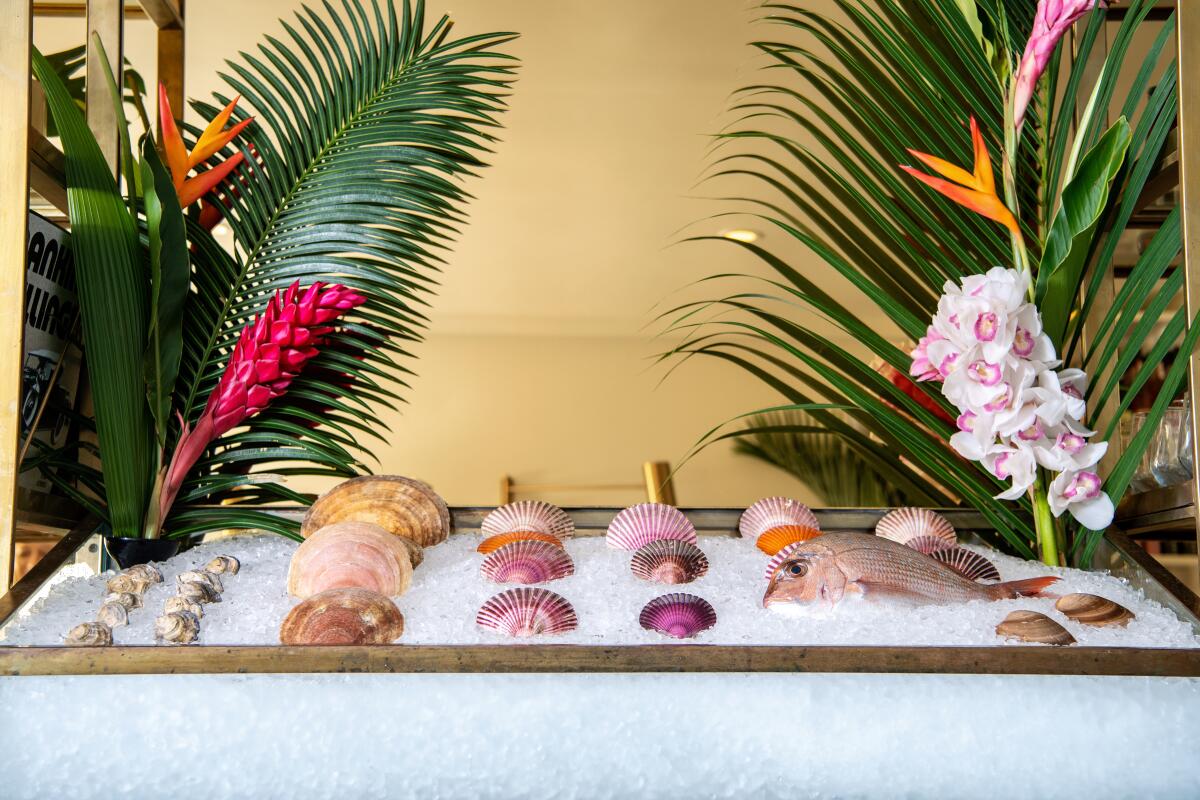
His composed tostadas, creativity-wise, set off the loudest fireworks. They’re monuments to fish built on pebbly-textured, undulating fried corn tortillas made in Guadalajara. (“I tried for years to make better tostadas myself,” he says. “I can’t.”) He builds a kanpachi tostada, arguably the menu’s centerpiece, over a thick smear of what Olivas calls avocado mousse; it’s too tart and restrained in seasoning to be labeled “guacamole.” On top he sculpts the fish around piles of trout roe, grapefruit crescents, nasturtium leaves and radish sprouts.
That enigmatic extra something sneaking through the ingredients? It’s tosazu, a Japanese dressing that includes katsuobushi, the fermented and smoked bonito that often gives dashi its potency.
Olivas frequently dreams up tostadas as daily specials; one colorful tumble of shrimp, tomatoes and cucumbers drizzled with smoky salsa negra reminds me of the kind of pristine combination served at Erizo Market in Tijuana, one of Baja’s standout seafood restaurants. He might swap in a similar variation piled generously with octopus.
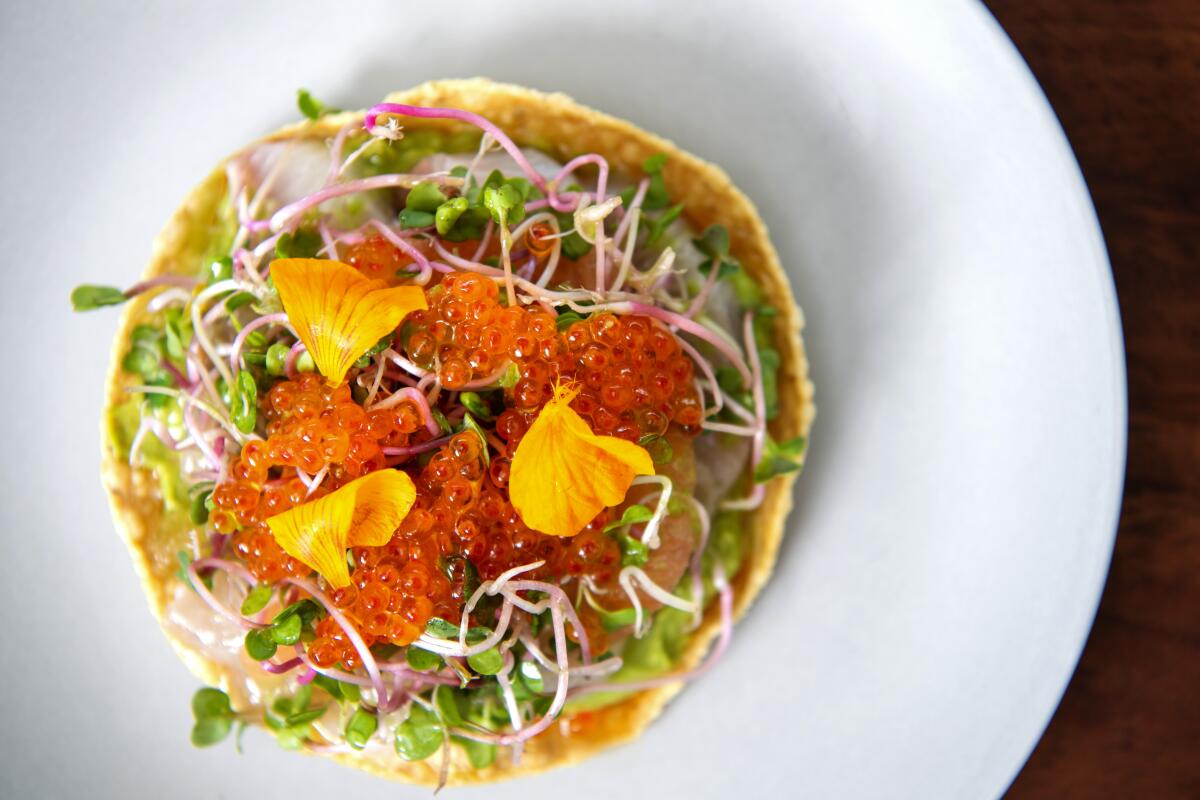
Keep an eye on the specials board hung to the left of the counter: Most of the time caviar is among the options. These are glory days for caviar in American restaurants, given the more sustainable and affordable varieties available today. Olivas prepares an elegant, on-brand spread for $40: a 1-ounce tin of California farmed white sturgeon roe paired with brightly popping trout roe, joined by sides of tostadas, crema and avocado.
The succinct drink list presents seven wines by the glass and four beers (two lagers, two pale ales) that match the food’s sunny disposition. With most of the dishes I lean toward an Austrian orange wine; with the caviar, I’ll sip a gently effervescent Ameztoi Txakolina rosé.
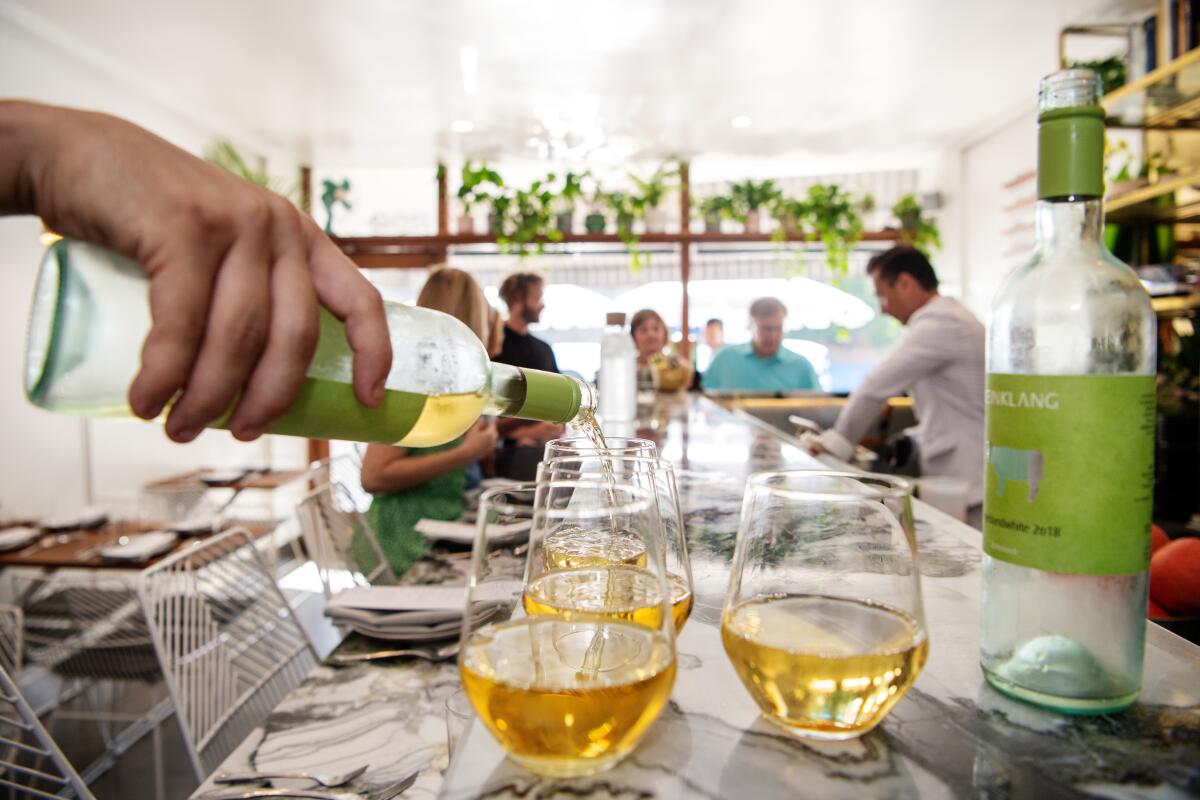
Ironically, given the restaurant’s namesake and the affection I feel for this place, the ceviches are the least compelling thing; they run a little too sweet for my taste, especially the tai snapper number with pineapple, though I enjoy its nod to Peruvian ceviches with the addition of corn nuts.
If you want a true dessert after a wonderfully weightless meal, Olivas offers a single confection: a peanut butter ball covered in dark chocolate and sprinkled with sea salt. I watch many customers succumb to its nostalgic tug.
It’s not really my yen. But I sit at the end of a meal at Ceviche Project, breathing in the restaurant’s cool air and the clean smell of the freshest seafood, and then I look through the window outside. The bare earth on a little hill across the street looks parched, and the leaves on a nearby tree seem to be clinging to their final supplies of chlorophyll. Maybe one more scallop on the half shell?
Ceviche Project
Ceviche Project
More to Read
Eat your way across L.A.
Get our weekly Tasting Notes newsletter for reviews, news and more.
You may occasionally receive promotional content from the Los Angeles Times.
